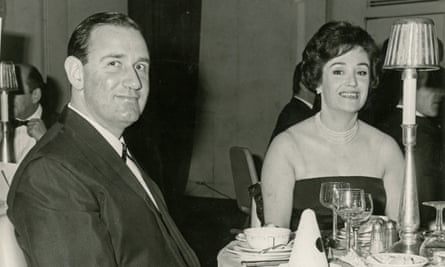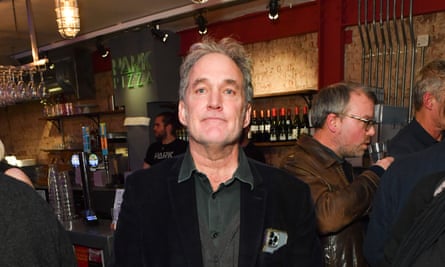At a recent dinner party I was asked about my mother, who – a gross simplification, this – was a bit of a character. I tried to paint a nuanced picture but our host, a qualified therapist, was having none of it. It ended badly, with her shouting at me: “Enough. Your mother was a monster!”
A not unreasonable diagnosis, given the facts. She sent me away to boarding school when I was three. When I was 13, she started telling me she had six months to live and kept telling me this, roughly every six months, for the next 15 years. Indeed, she once pretended to die in front of me. I’m still not sure why.
I remember it well, not surprisingly. She summoned me to her bed, where she lay prostrate and still. “The money … for your education …,” she whispered, “… is in the bottom drawer … Urgh!” She then – apparently – expired. Half an hour later, the ambulance having arrived (“My mum’s just died – I think”), she was laughing and joking with the ambulance men, offering them cheesecake and telling jokes.
Even more shocking, perhaps, was her cavalier treatment of others. In the late 1960s, she ran an old people’s home, but it was closed down by the local authority after one of her residents, a rich estate agent, made her his sole beneficiary.
It was an appalling conflict of interest. However, the old man’s family, although deeply suspicious, didn’t want to bring criminal charges. After that she turned our family home into Britain’s first ever gay hotel. In deeply conservative Surrey in the 1970s. She wanted to call it “Homolulu” but the council wouldn’t let her, so she settled on the Nonsuch Park hotel, after the park across the road. Our neighbours were horrified.
And she was emotionally abusive. When we argued, she would tell me that all my friends secretly hated me. After one particularly toxic argument, she wrote to my sister, saying: “You need to know the truth. You are not my daughter. You are the daughter of a prostitute. My real daughter was stillborn. But the nurses took pity and swapped the pair of you.” (A crazed fiction which, I now realise, was inspired by the plot of The Omen, a popular film at the time.)
I know: it doesn’t read well. But it is, essentially, a shopping list of her appalling greatest hits and thus lacks context. There is a case for the defence.
Jonathan Maitland’s father, Ivor, and his mother, Bru, divorced when he was six years old. Photograph: Jonathan MaitlandShe and my father divorced when I was six: she became a single parent in 1970s Britain, with four kids. She became obsessed, rightly or wrongly, with the idea that an expensive private school education was the best thing she could give us.
This was not an ideal shared by my father, who was even less suited to parenting than her. During rows, he would refer to my three siblings and me not as “my kids” or “our children” but “four fucks. That’s all they are! Four fucks!” Accurate, biologically speaking, but also solid grounds for divorce.
So for her, given the circumstances, the ends (single-handedly providing for her children) justified the means (ripping off old people and taking no prisoners). This isn’t a defence; it’s an explanation. She was also very entertaining and hugely generous. And very proud of her kids. (“Three million people applied to the BBC. And they took only one person. My son, Jonny!”)
Thanks to her, I accrued a wide circle of friends, who loved hearing about, and witnessing, her latest outrages. And she was brave. When she was given the equivalent of a trolling over her gay hotel, she defended her clientele in the local and national press. They had been accused of being a danger to children.
“My guests are not paedophiles,” she said (this was the neanderthal, unenlightened 1970s, remember). “They are homosexuals. These are two very different things.”
Plenty of drama then. During one argument, I asked her about the plasters over her eyes. I was being mischievous: I knew she’d had cosmetic surgery. “OK,” she said. “You want the truth? The real truth?” “Sure,” I said. “OK,” she said. Pause, for dramatic effect. “I have cancer of the eyebrows.”
Author and playwright Jonathan Maitland. Photograph: Dave Benett/Jed Cullen/Getty ImagesGood copy then. Which is why I wrote a book about her in 2005 and have now created a play about our relationship. A risky creative endeavour, for sure, but cheaper than therapy. (Which I have tried, by the way. It didn’t go well. The therapist and I – not the dinner party one – ended up arguing.)
Another therapist friend – I have a few; they find me fascinating for some reason – reckons my mother had a textbook case of narcissistic personality disorder (NPD). “He/she was a narcissist,” is of course the go-to diagnosis-cum-insult de nos jours, especially for angry divorced people slagging off their ex-partners. But the evidence here is compelling.
When I googled NPD, it read less like a list of symptoms and more like an uncanny character study of my mum. The list included: an overwhelming sense of self-importance; a preoccupation with beauty, power and success; a tendency to exploit others; arrogance; and a need to be admired. The clinching symptom, though, was a lack of empathy. She never realised the pain she caused us. Or others.
Once, a neighbour threw a birthday party for his daughter. Around midnight, my mother knocked on their front door, in her nightie, to complain about the noise. The birthday girl explained that it was her 21st. “In that case, I hope you never live to see your 22nd!” replied my mother.
The birthday girl, my mother proudly announced the next morning, cackling at the memory, burst into tears.
I’m aware this all sounds rather unusual. But is it? Having heard many hundreds of stories of dysfunctional parenting over the years, I now suspect my experience wasn’t that extraordinary at all.
The specifics of her behaviour might have been remarkable but we all know – or perhaps belong to – families where there has been some form of abuse. In less-demonstrative households than ours, the abuse might have been more subtle and low-key but it will have been no less damaging for all that. Hence the overquoted but so very true Philip Larkin line about what “your mum and dad” do to you.
It has taken a lifetime to process all this and I haven’t finished yet. But, I am proud to say, I have arrived at a place of forgiveness and understanding. My (non-dinner party) therapist friend reckons my mother was a classic “wounded” narcissist: that is, someone who suffered terrible trauma during her childhood. From what I know of her relationship with her father, that’s highly plausible.
And while we’re on the positives, she gave me a great gift, arguably: a fantastic example not to follow. All my life I have striven to be a better parent to my son and stepsons than my parents were to me. If I achieve that, I will consider myself a success. A low bar, admittedly.
But that’s what parenting is about, isn’t it? Trying to be a less shit parent to your own kids than your parents were to you.
How to Survive Your Mother runs at the King’s Head theatre, London, from 23 October to 25 November
∎

